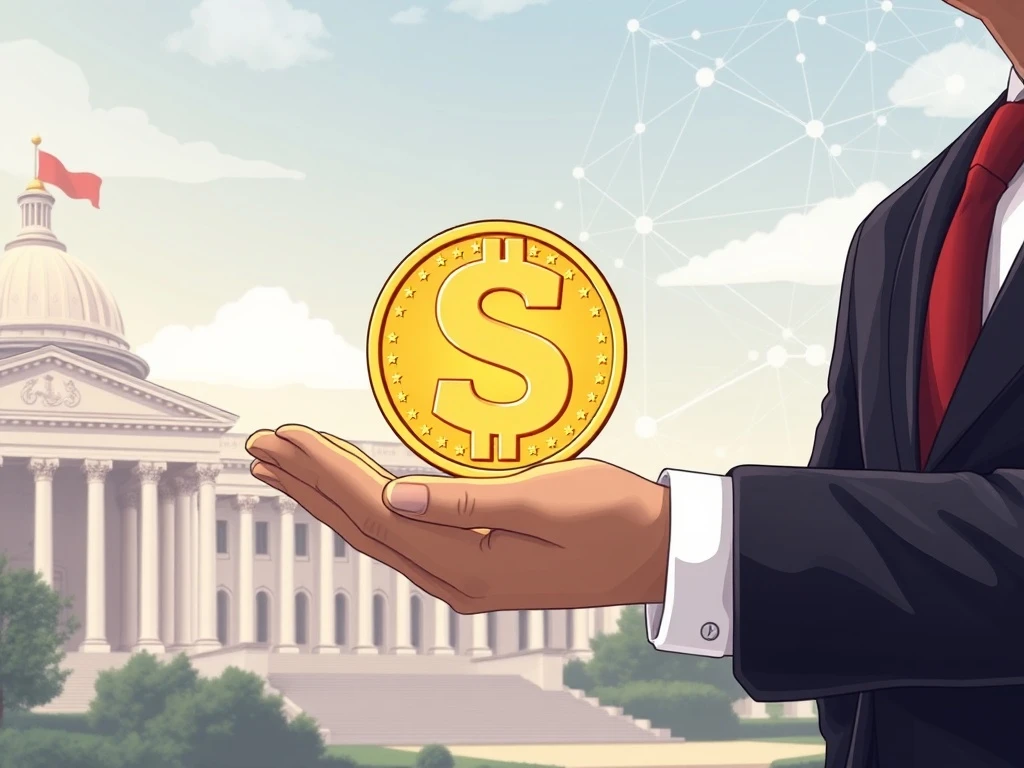Alarming Trump Stablecoin Conflicts: Democrats Demand Answers on Regulation Integrity

The intersection of politics and cryptocurrency is becoming increasingly complex, especially when powerful figures are involved. Recent developments have thrust the spotlight onto a specific type of digital asset: the stablecoin. For anyone deeply invested in the crypto space, or even just observing its evolution, understanding the underlying currents of regulation and potential influence is crucial. This is particularly true as Democratic senators raise serious questions about the potential for financial conflicts of interest involving a new Trump stablecoin, USD1, and its implications for the broader financial system.
Unpacking the Trump Stablecoin Controversy
At the heart of the current debate is USD1, a stablecoin launched by World Liberty Financial, a decentralized finance platform linked to the Trump family. This venture has quickly gained attention, not just for its market presence, but for the unprecedented nature of its association with a prominent political figure.
Key points about the USD1 stablecoin:
- Launch: Announced in March 2024 by World Liberty Financial.
- Market Position: It has rapidly ascended, becoming the seventh-largest stablecoin globally with a market capitalization exceeding $2.17 billion, surpassing established players like PayPal and Ripple’s stablecoins.
- Family Ties: Senators Elizabeth Warren, Chris Van Hollen, and Ron Wyden have highlighted that the Trump family’s personal wealth is intricately tied to the success of USD1 and their other crypto ventures, including a crypto mining firm and a trading platform.
The senators’ primary concern stems from the belief that a sitting President could directly influence national cryptocurrency policy to their financial benefit, creating what they describe as an ‘unprecedented conflict of interest’ that poses ‘significant threats to our financial system.’
The Stakes of Stablecoin Regulation
Stablecoins are designed to maintain a stable value, typically pegged to a fiat currency like the US dollar. Their growing adoption means robust and clear regulation is essential for financial stability and consumer protection. The recently approved GENIUS Act plays a pivotal role here, appointing the Office of the Comptroller of the Currency (OCC) as the primary regulator for stablecoins.
This legislative move was intended to bring clarity and oversight to a rapidly expanding sector. However, the senators argue that while the bill establishes regulatory frameworks, it ‘does nothing to prevent President Trump, his family, or his affiliates from financially benefiting from the issuance and sale of stablecoins and their use in transactions.’
The core challenge lies in ensuring that the regulatory environment for stablecoins remains impartial and serves the public interest, free from undue influence. Effective stablecoin regulation is critical for:
- Maintaining financial stability.
- Protecting consumers and investors.
- Preventing illicit financial activities like money laundering.
- Fostering innovation within a secure framework.
The concerns raised by the senators underscore the delicate balance between promoting crypto innovation and safeguarding the integrity of the financial system through transparent and equitable rules.
Navigating the Conflict of Interest Minefield
The senators’ letter to OCC head Jonathan Gould explicitly details several areas of potential conflict of interest. Their primary apprehension is that the Trump family’s financial stakes in crypto ventures, particularly USD1, could compromise the impartiality of regulatory decisions.
One specific transaction highlighted as a ‘staggering model for corruption’ is a reported $2 billion deal. This deal involves Emirati firm MGX investing in crypto exchange Binance using USD1. The senators expressed alarm over USD1 being used to finance:
- A foreign government-backed entity (MGX).
- A foreign corporation (Binance) that previously pleaded guilty to criminal violations of U.S. anti-money laundering and sanctions laws.
Reports also suggest that Binance helped create the underlying code for USD1, further intertwining these entities. This scenario raises serious questions about the transparency and ethical boundaries of financial transactions involving politically connected entities and their digital assets. The potential for such deals to net the Trump family ‘potentially hundreds of millions of dollars’ while influencing regulatory outcomes is a significant point of contention.
The Imperative of Robust OCC Oversight
Given its role as the primary regulator for stablecoins under the GENIUS Act, the OCC’s actions and independence are under intense scrutiny. Senators Warren, Van Hollen, and Wyden have directly questioned Comptroller of the Currency Jonathan Gould on how he plans to prevent Donald Trump from influencing stablecoin rules that might benefit his family’s financial interests.
The letter posed pointed questions to Gould, seeking clarity on:
- His belief regarding the President’s power to remove him ‘at his pleasure.’
- Whether he would resign and provide evidence to Congress if pressured to make decisions benefiting the Trump family’s crypto ventures.
- If the OCC would open an investigation into World Liberty Financial’s competitors, suggesting a potential for anti-competitive practices or biased regulation.
The senators have demanded answers by August 14, emphasizing the urgency of clear and decisive action regarding OCC oversight. This pressure highlights the critical need for regulatory bodies to operate with unquestionable independence, especially when dealing with assets that could blur the lines between private financial gain and public policy.
Upholding Crypto Ethics in a Political Landscape
Beyond the immediate concerns of specific transactions and regulatory independence, this situation brings broader questions about crypto ethics to the forefront. The cryptocurrency industry, still relatively nascent compared to traditional finance, relies heavily on trust and transparency to gain mainstream adoption.
When political influence potentially intertwines with financial interests in digital assets, it can:
- Erode public trust in stablecoins and the wider crypto ecosystem.
- Create an uneven playing field for competitors.
- Undermine the perceived fairness and integrity of the financial system.
The senators’ actions are a call for accountability, aiming to ensure that the principles of fair play and ethical conduct are upheld even as cryptocurrency integrates more deeply into the global economy. For the crypto community, this episode serves as a reminder that regulatory scrutiny will intensify as the industry matures, and ethical considerations will become paramount.
Conclusion
The concerns raised by Democratic senators regarding the Trump family’s stablecoin ventures and their potential influence on regulation underscore a critical juncture for the cryptocurrency industry. As stablecoins become integral to the future of finance, the integrity of their regulatory framework is paramount. The demands for transparency and accountability from the OCC highlight the urgent need to address potential conflicts of interest head-on. This ongoing saga is a vital reminder that for crypto to truly flourish, it must operate within a system built on trust, fairness, and unwavering ethical standards, free from the shadow of political or financial manipulation.










